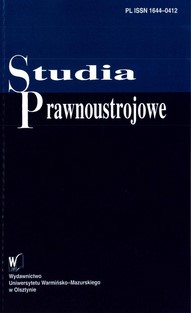Wybrane problemy prawne związane z opodatkowaniem gruntów pod napowietrznymi liniami elektroenergetycznymi
Selected legal problems related to the taxation of land under overhead power lines
Author(s): Edyta Jóźwiak, Anna KlimachSubject(s): Agriculture, Fiscal Politics / Budgeting, Administrative Law
Published by: Wydawnictwo Uniwersytetu Warmińsko-Mazurskiego w Olsztynie
Keywords: law; administrative decision; transmission devices; taxation of land held by a transmission company; overhead power lines; forest land; agricultural land; land related to business activities;
Summary/Abstract: In 2018, an amendment to the Law on Agricultural Taxes, the Law on Local Taxes and Fees and the Law on Forest Taxes have been amended. Under the influence of the introduced regulations, the jurisprudential view on the assessment and rate of agricultural and forestry tax has changed significantly. Previously, the tax authorities had no doubt that the only appropriate taxation was agricultural or forestry taxation, depending on where the transmission facilities were located (on agricultural land or forestry land). As a result of the change in the law, the authorities have begun to amend previous administrative decisions and adjudicate tax on land under overhead power lines as if they were occupied for business purposes. The purpose of this article is to try to answer the question of how the land under overhead power lines, designated as forest and agricultural land in the land records, should be taxed in connection with these changes. There is no doubt that, as a rule, forest/agricultural land is taxed with property tax at a higher rate when it is seized for business purposes, otherwise the land should be taxed on general principles. Therefore, to solve the above-mentioned problem, it is helpful to answer the question of what is meant by the concept of land “occupied” for conducting business activity, referred to in Article 2 paragraph 2 of the Act of 12 January 1991 on local taxes and fees. However, the answer to this question is not simple, because it does not result directly from the law, and therefore depends on the process of interpretation and interpretation of the law at the stage of its application. In addition, attention should also be paid to whether the mere existence of over-head lines does not exclude the possibility of carrying out forestry or agricultural activities on them, and if so, whether this fact should have an impact on the assessment of the tax. In the authors’ opinion, considering the current legal status of the administrative bodies, the practice is not supported by law and should not be implemented.
Journal: Studia Prawnoustrojowe
- Issue Year: 2023
- Issue No: 59
- Page Range: 177-190
- Page Count: 14
- Language: Polish

